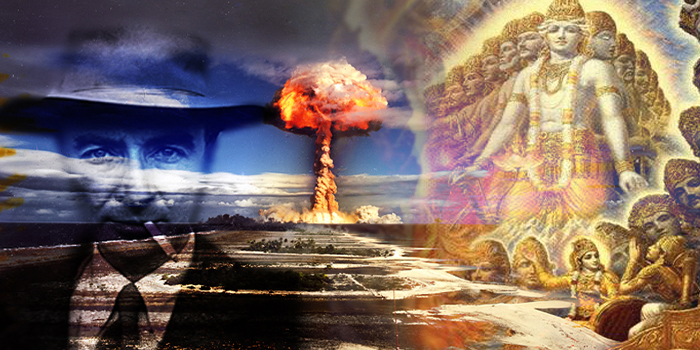 J. Robert Oppenheimer (April 22, 1904 – February 18, 1967) was an American theoretical physicist, best known for his role as the scientific director of the Manhattan Project, the World War II effort to develop the first nuclear weapons, at the secret Los Alamos laboratory in New Mexico. He is famously refereed to as “the father of the atomic bomb”.At the Trinity test site in Los Alamos New Mexico he uttered the words :
J. Robert Oppenheimer (April 22, 1904 – February 18, 1967) was an American theoretical physicist, best known for his role as the scientific director of the Manhattan Project, the World War II effort to develop the first nuclear weapons, at the secret Los Alamos laboratory in New Mexico. He is famously refereed to as “the father of the atomic bomb”.At the Trinity test site in Los Alamos New Mexico he uttered the words :
“Now, I am become Death, the destroyer of worlds”,
after he had seen the fireball glowing after the bomb had been dropped. This quote has become infamous and it is actually chapter 11 verse 32 of the Bhagavad-Gita, a scripture which has been revered by Hindus for thousands of years.
Although Oppenheimer never converted to Hinduism nor did he ever refer to himself as a Hindu, Hindu philosophy did influence him greatly perhaps more than anything else. He never prayed to Hindu deities or ever went to a Mandir (Hindu temple). He was never a Hindu in a devotional sense, but he did take up Sanskrit lessons so he could better understand the Gita in its native tongue.
 Oppenheimer, although raised in a Jewish environment, was deeply affected by Vedic philosophy.His brother said that Oppenheimer found the Bhagavad-Gita “very easy and quite marvellous… (and) was really taken by the charm and the general wisdom of the Bhagavad-Gita”.
Oppenheimer, although raised in a Jewish environment, was deeply affected by Vedic philosophy.His brother said that Oppenheimer found the Bhagavad-Gita “very easy and quite marvellous… (and) was really taken by the charm and the general wisdom of the Bhagavad-Gita”.
Oppenheimer also claimed that, “access to the Vedas is the greatest privilege this century may claim over all previous centuries”
Remarkably he even once hinted at the possibility of weapons on par of the nuclear ones who was working on in previous eras, particularly those of the Ramayana and Mahabharata.
 While he was giving a lecture at Rochester University, during the question and answer period a student asked a question to which Oppenheimer gave a strangely qualified answer:
While he was giving a lecture at Rochester University, during the question and answer period a student asked a question to which Oppenheimer gave a strangely qualified answer:
Student: “Was the bomb exploded at Alamogordo during the Manhattan Project the first one to be detonated?
Dr. Oppenheimer: “Well — yes. In modern times, of course.
Some people suggest that Oppenheimer was referring to the Brahmāstra weapon mentioned in the Mahabharata.The appreciation didn’t stop there. So much so he always gave the book (Bhagavad Gita) as a present to his friends and kept a copy on the shelf closest to his desk.
At Franklin Roosevelt’s funeral he read a passage from the Gita chapter 17 verse 3 ,
“Man is a creature whose substance is faith, what his faith is, he is”.
 In 1963, the Christian Magazine asked him to list his 10 most influential books, he chose the Bhagavad-Gita as one of them.However a question remains on how someone who said the devastation the bomb caused Japan represented the “inhumanity and evil of modern war” and believer in the Bhagavad-Gita (after all Gandhi also cited the Bhagavad-Gita as instrumental in his peaceful non violent approach to life) managed to reconcile himself with the task of creating such a potentially world destroying instrument such as the atomic bomb and yet at the end of it and still believe it was the correct thing to do.
In 1963, the Christian Magazine asked him to list his 10 most influential books, he chose the Bhagavad-Gita as one of them.However a question remains on how someone who said the devastation the bomb caused Japan represented the “inhumanity and evil of modern war” and believer in the Bhagavad-Gita (after all Gandhi also cited the Bhagavad-Gita as instrumental in his peaceful non violent approach to life) managed to reconcile himself with the task of creating such a potentially world destroying instrument such as the atomic bomb and yet at the end of it and still believe it was the correct thing to do.
He admitted himself that he had blood on his hands and the people behind it had “known sin”. But he still was adamant that he had done the right thing. He believed that the bomb would save more lives by stopping the carnage that was World War II in that the bomb would frighten other would be aggressors thereby, in theory, preventing many future conflicts
‘And even if thou were the greatest of sinners, with the help of the bark of wisdom thou shalt cross the sea of evil‘ (Gita 4:36)
 In the Gita Arjuna is an uncertain soldier unwilling to fight, for he believes it is a great sin to kill. It’s not hard to see what Oppenheimer would have seen in Arjuna and how his predicament was so similar to his own.
In the Gita Arjuna is an uncertain soldier unwilling to fight, for he believes it is a great sin to kill. It’s not hard to see what Oppenheimer would have seen in Arjuna and how his predicament was so similar to his own.
Krishna tells Arjuna to fight because not doing so would in fact be the greater sin. In the Mahabharata Arjuna and his brothers (the Pandavas) are fighting for their kingdom that has been wrongly denied to them (by their cousins the Kauravas who now rule), the Bhagavad-Gita takes place when the opposing armies are ready to face each other on the battlefield and Arjuna’s conscience comes into play.
Krishna reminds Arjuna that he and his brothers have expired all solutions through a peaceful method; they have even had to gamble in a knowingly rigged game just to prevent a war and bloodshed.
Krishna reminds him that the enemies are full of vices, even if they happen to be Arjuna’s family and teachers, and if they were allowed to succeed then the consequences for society would be disastrous, since the Kauravas have proven to be deceitful and cruel rulers. In all probability Oppenheimer must have seen a correlation between the Allies and the Axis. If he didn’t help the Allies create the bomb then the Japanese and Nazis may have got there first and then the consequences would’ve been even graver.
Yudhhistra (Arjuna’s older brother) in the Mahabharata states :
“war is evil in any form” and says that killing friends and relatives is “a most evil thing”. However Yuddhistir accepts that he still has to do it.
“It is the evil law of barons and we have been born in the baronage. It is our Law though be it Lawless, any other way is forbidden to us”.
Arjuna is a soldier and it is a soldier’s duty to fight. It is Krishna, not Arjuna, who determines who lives and who dies and Arjuna should neither rejoice nor mourn what fate has in store for him since he has no power of the results but only his actions.Just as he saw Arjuna fighting after hearing the Gita, because he was now convinced that fighting was his duty and not doing so would have been a greater calamity, so Oppenheimer reconciled himself with the fact that since he was a scientist it was his job and duty to serve on the Manhattan project.
A key concept of the Gita is that one had the right to his/her duty but never to its fruit as that is what leads one to sin.
Set thy heart upon thy work but never on its reward. Work not for a reward but never cease to do thy work (Gita 2:47)
Not by refraining from action does one attain freedom from karma. Not by mere renunciation does one achieve Perfection. No one attains perfection by giving up their work (Gita 3:4)
In ending, we may quote another one of the 10 books that Oppenheimer listed as an important influence on his life – the Satakatrayam of Bhatrihari:
Vanquish enemies at arms
Gain mastery of the sciences
And varied arts
You may do all this but karmas force
Alone prevents what is not destined
And compels what is to be
Dr. J. Robert Oppenheimer saying the Bhagavad-Gita quote live –
Video Player




































I would like to add another bit of info……..
The part of Oppenheimer’s speech where he mentions the Gita was included in Linkin Park’s album called ‘A Thousand Suns’ which was released in 2011.
The album was named ‘A Thousand Suns’ after Arjuna’s description of the Vishwarupa ( Krishna’s universal form) where he says that Krishna’s brightness was like that of a thousand suns shining together.
Brilliant eh???